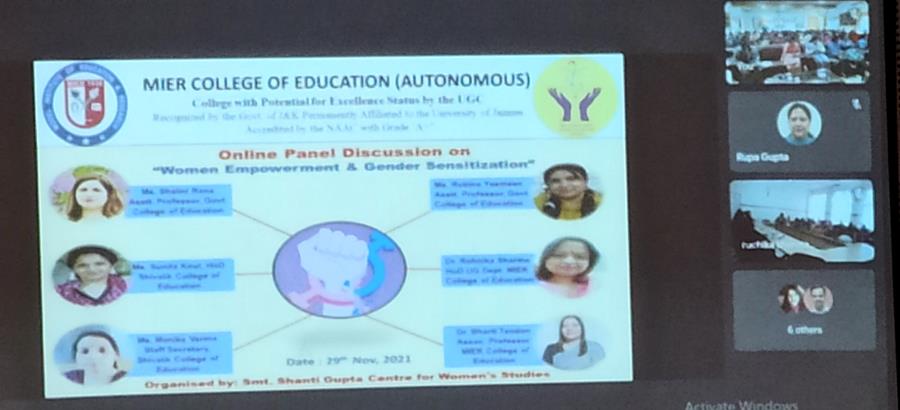Panel Discussion on Women Empowerment
DATE Nov 30, 2021
VENUE Online
Smt. Shanti Gupta Centre for Women Studies (SSGCWS), MIER in collaboration with Govt. College of Education, Canal Road and Shivalik College of Education, Udhampur organized a panel discussion on the topic “Women Empowerment and Gender Sensitization”. Dr Adit Gupta, Principal and Director MIER, Mrs Rupa Gupta, Joint Director and Director, CWS MIER, Dr. Moolraj Sharma HOD, PG dept. Dr. Nishta Rana & Dr. Monika Bajaj, Deputy HODs of PG & UG depts. along with the faculty members and students graced the occasion.

There were six panelists namely Ms. Shalini Rana and Ms. Rubina Yasmeen, Assistant Professors from Govt. College of Education, Ms. Sunita Kaul, HoD and Ms. Monika Verma, lecturer of Hindi from Shivalik College of Education, Dr. Rohnika Sharma and Dr. Bharti Tandon from MIER College of Education, deliberated on the topic followed by a Q&A session. The programme was conducted through hybrid mode. Mrs. Rupa Gupta, Director SSGCWS, formally welcomed the panelists and introduced them to the audience. She stated that woman’s empowerment and establishing gender equality aid society in ensuring a country& long-term growth. Higher education for women is thought to boost employment opportunities. Similarly, employed women can contribute to their family income
as well as the country, socioeconomic progress. Women, complete engagement in education and employment is required to achieve full empowerment. Ms. Yasmeen spoke on the various causes of gender inequality and presented real-life examples. She recounted her own experiences as well as her story of overcoming all of the difficulties she had faced in her life. She explained that education is the only thing that may assist women in overcoming their difficulties. Having a claim to their land offers women bargaining power they wouldn't otherwise have, and it gives them additional prospects for economic independence. According to Ms. Shalini Rana, a woman must first recognize her own worth. She concentrated on four areas that she believes are critical for womens empowerment and equality. Place women in positions of leadership and decision-making, she said. She went on to say that education and economic empowerment can be important weapons for bringing about the changes in peoples minds that are necessary for equality. One of the most effective ways to assist women in becoming more powerful is through technology.
Speaking on the topic, Ms. Sunita Kaul and Ms. Monika Verma shared their own experiences with gender discrimination. They proposed a number of essential strategies for empowering
women and reducing gender disparities. Womens empowerment is critical for the health and development of families, communities, and nations. The path to economic prosperity, political stability, and social revolution is to empower females. According to Dr. Rohnika Sharma, female role models are making a difference in the fight for women's equality today. It's encouraging to witness a growth in good will and debate on women's equal representation at home and at work. In other ways, women are still fighting for
full recognition. To support her arguments, she displayed a movie on rural women entrepreneurs. Dr. Tandon said that gender inequality, is a multifaceted and complex issue that necessitates
sensitive but forceful interventions such as attitude modification, curricular changes, pedagogical amends, institutional facilitators, infrastructural enablers, and involvement of all stakeholders.
She highlighted that women and girls with disabilities have been invisible, both to the advocates of women and disability rights, and this has increased their vulnerability to “double discrimination” because of gender and disability. Dr. Reeta Dwivedi, Convener SSGCWS, MIER College of Education presented a formal vote of
thanks. Mrs. Manju Wali, senior faculty, Model Academy School, ably conducted the program. Technical assistance was provided by Mr. Rajan Salathia.


